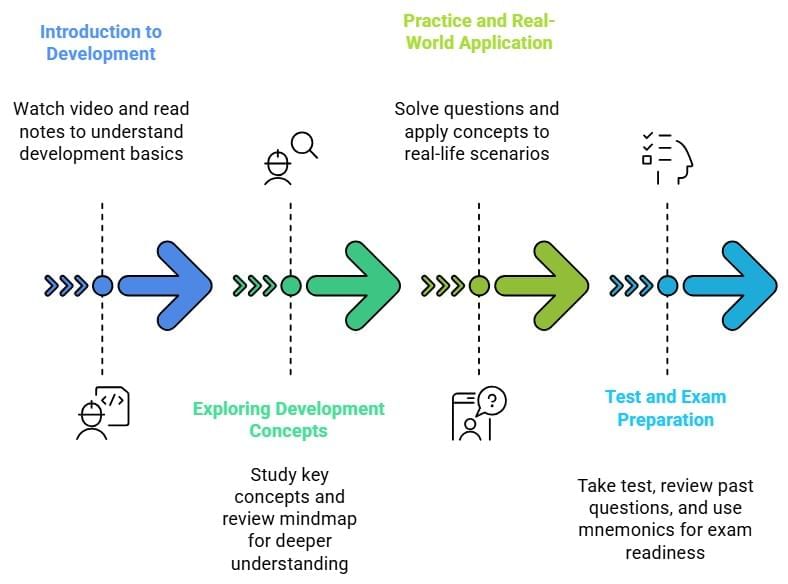4 Days Timetable: Development | Social Studies (SST) Class 10 PDF Download
| Table of contents |

|
| Day 1: Introduction to Development |

|
| Day 2: Exploring Development Concepts |

|
| Day 3: Practice and Real-World Application |

|
| Day 4: Test and Exam Preparation |

|
The chapter "Development" is an important part of Class 10 Social Science, specifically from the book "Understanding Economic Development." This chapter delves into various aspects of development, including income, national development, public facilities, sustainability, and more. It is crucial to understand these concepts thoroughly as they form the foundation for economic and social development. This study plan will help you prepare effectively for the Class 10 board exam.
Topics to Cover
Before we begin, let's list the topics that we need to cover in this chapter:

Day 1: Introduction to Development
Goal: Understand what development means and its key ideas.
- Morning (30 mins): Watch the Development video for a simple overview.
- Afternoon (45 mins): Read Chapter Notes: Development to learn about development indicators like income and literacy.
- Evening (30 mins): Use Flashcards: Development-1 to memorize terms like HDI and sustainable development.
Day 2: Exploring Development Concepts
Goal: Dive deeper into how development is measured and its challenges.
- Morning (40 mins): Study Key Concepts: Development to understand development goals and issues.
- Afternoon (45 mins): Review the Mindmap: Development to connect key ideas.
- Evening (30 mins): Practice Very Short Questions: Development to test your knowledge.
Day 3: Practice and Real-World Application
Goal: Solve questions and apply concepts to real-life scenarios.
- Morning (45 mins): Work on Short Answer Questions: Development to practice writing clear answers.
- Afternoon (40 mins): Study the Cheatsheet: Development for quick revision.
- Evening (45 mins): Try Case Based Questions: Development to understand development in real-world contexts.
Day 4: Test and Exam Preparation
Goal: Test your knowledge and prepare for exams.
- Morning (45 mins): Take the Test: Development - 1 to check your understanding.
- Afternoon (40 mins): Review Previous Year Questions: Development to focus on exam-important topics.
- Evening (30 mins): Use Mnemonics: Development to remember key points easily.
Tips to Study Better
- Write Notes: Jot down key points in simple words to help you remember.
- Stay Focused: Study in a quiet place and keep distractions like your phone away.
- Revise Daily: Spend 10 minutes each night reviewing what you studied.
- Ask Questions: If something is unclear, ask your teacher or friends for help.
- Take Breaks: Study for 45 minutes, then take a 5-10 minute break to stay fresh.
Here are all the important links and topic links for the chapter "Development" from Class 10 Social Science:
Important Links:
- Class 10 Boards: Explore resources for Class 10 board exams on EduRev.
- Past Year Questions: Access past year questions for practice.
- Chapter: Development
Topic Links:
- Chapter Notes on EduRev
- NCERT Textbook: Development
- NCERT Solutions: Development
- Short & Long Questions
- Topic Wise Tests
- Mindmaps on EduRev
- Assertion & Reason Type Questions
- Practice Questions
- Case-Based Questions on EduRev
- Flowcharts & Important terms
- PPT: Development
- Worksheet: Development
- Worksheet Solutions: Development
- Key Concepts
These links will provide you with a comprehensive set of resources to study and prepare for the Class 10 Social Science board exam's "Development" chapter. Good luck with your studies!
Good luck with your studies!
|
66 videos|614 docs|79 tests
|
FAQs on 4 Days Timetable: Development - Social Studies (SST) Class 10
| 1. What are the main development goals outlined in the curriculum for Class 10? |  |
| 2. How does income affect national development? |  |
| 3. What are some examples of public facilities that contribute to development? |  |
| 4. Why is sustainability important in the context of development? |  |
| 5. How can students prepare for exams on the topic of development? |  |
















